
Bajaga i Instruktori are a Serbian and Yugoslav rock band formed in Belgrade in 1984. Founded and led by vocalist, guitarist and principal composer and lyricist Momčilo Bajagić "Bajaga", the group is one of the most notable acts of the Yugoslav rock scene.

Momčilo Bajagić, better known under pseudonym Bajaga, is a Serbian rock musician. He is best known as the leader of the Serbian and former Yugoslav rock band Bajaga i Instruktori, as well as a former member of the rock band Riblja Čorba.

SPC Vojvodina, short for Sports and Business Center Vojvodina, commonly referred to as SPENS, is a multi-purpose venue located in Novi Sad, Vojvodina, Serbia.
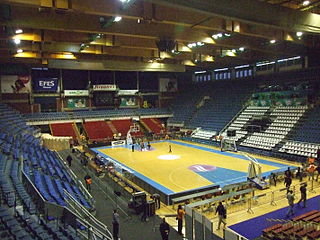
The Aleksandar Nikolić Hall, formerly known as Pionir Hall, is an indoor sports arena located in Palilula, Belgrade, Serbia. The official seating capacity of the arena is 8,000.

Jugoton was the largest record label and chain record store in the former Yugoslavia based in Zagreb, SR Croatia.
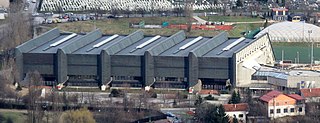
The Juan Antonio Samaranch Olympic Hall is an indoor multi-purpose arena in Sarajevo, Bosnia and Herzegovina. Named in honor of Juan Antonio Samaranch in 2010 after his death, it was used for various sporting events at the 1984 Winter Olympics, and as the main venue of the 2019 European Youth Olympic Winter Festival.

The Ranko Žeravica Sports Hall is a multi-purpose sports arena located in the Belgrade municipality of New Belgrade.

The Mirza Delibašić Hall, commonly known as Skenderija Hall (Скендерија), is an indoor sporting arena located in Sarajevo, Bosnia and Herzegovina, as a part of Skenderija.

Bijelo Dugme is the seventh studio album by Yugoslav rock band Bijelo Dugme, released in 1984. Due to Bijelo Dugme's usage of Uroš Predić's famous painting Kosovo Maiden for the album cover, the album is unofficially known as Kosovka djevojka.

Tašmajdan Sports and Recreation Center, commonly known simply as Taš, is a sporting and recreational center located in the city of Belgrade, Serbia. It was founded by the Assembly of the City of Belgrade in 1958.
Popular music in Yugoslavia includes the pop and rock music of the former SFR Yugoslavia, including all their genres and subgenres. The scene included the constituent republics: SR Slovenia, SR Croatia, SR Bosnia and Herzegovina, SR Montenegro, SR Macedonia and SR Serbia and its subunits: SAP Vojvodina and SAP Kosovo. The pop and rock scene was a part of the general Music of Yugoslavia, which also included folk, classical music, jazz etc. Within Yugoslavia and internationally, the phrases ex-YU or ex-Yugoslav Pop and Rock both formally and informally generally to the SFRY period, though in some cases also to its successor the FR Yugoslavia including Serbia and Montenegro which existed until 2006.
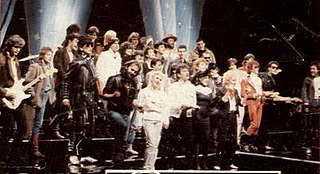
YU Rock Misija was the Socialist Federal Republic of Yugoslavia's contribution to Bob Geldof's Band Aid campaign, which culminated with the Live Aid concert. It consisted of recording the "Za milion godina" charity single and staging a concert held at Red Star Stadium in Belgrade on 15 June 1985, both featuring top acts of the Yugoslav rock scene. The proceeds from both the single and the concert were given to Band Aid.

Riblja Čorba is a Serbian and former Yugoslav rock band formed in Belgrade in 1978. The band was one of the most popular and most influential acts of the Yugoslav rock scene.
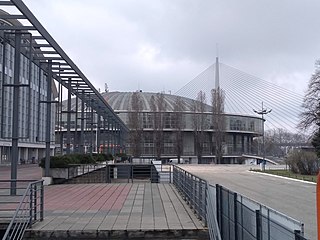
The Belgrade Fair – Hall 1, is Belgrade Fair's largest exhibition space. The hall opened to the public in 1957. It was the world's largest dome between 1957 and 1965 and is Europe's largest dome.

Pinki Cultural and Sports Center, commonly known as Pinki Hall, is an indoor multi-sports venue located in Belgrade's municipality of Zemun, Serbia. The venue has an indoor hall and an indoor swimming pool. The hall has a seating capacity of 2,300 for sports events and around 5,000 for concerts.
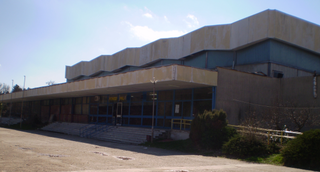
Sports hall Boro Churlevski,, formerly known as Sports hall "Mladost" is a multi-purpose sports arena located in Bitola, North Macedonia. It was built in 1975 by the citizens of Bitola and is mainly used for handball by RK Eurofarm Pelister, and for basketball by KK Pelister. There is also room for bowling and table tennis plus it has been used for concerts. The Arena hosted the 2007 Macedonian Basketball Cup. This sports hall was the largest on the territory of Republic Macedonia before the construction of the Boris Trajkovski Sports Center in Skopje.

Hokejski klub Olimpija Ljubljana is a professional ice hockey club from Ljubljana, Slovenia. The club competes in the ICE Hockey League and the Slovenian Championship. Founded in 2004 as a farm team of HDD Olimpija, the club turned professional in 2017 after HDD Olimpija folded. Olimpija won the Slovenian Championship four times, in 2019, 2022, 2023 and 2024, and the Alps Hockey League twice, in 2019 and 2021. They play their home games at Tivoli Hall.
Rockovnik is a forty-episode documentary aired on Radio Television of Serbia in 2011, written by Sandra Rančić and Dušan Vesić and directed by Vesić. The series focuses on the history of former Yugoslav rock scene from its beginnings in the late 1950s until the year 2000. The name of the show is a bilingual pun based on the words "rock" and "rokovnik".
Texas Flood is a Serbian blues rock band formed in Belgrade in 2006. In the years following the formation, the band have established themselves as one of the most prominent blues rock acts of the Serbian rock scene.

















